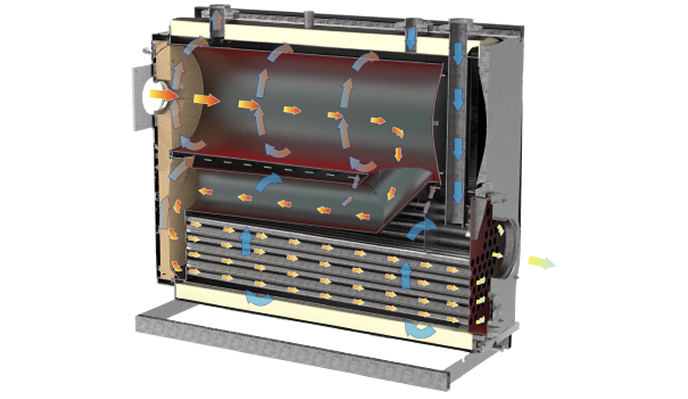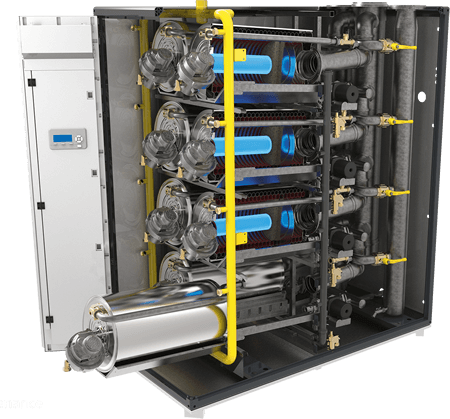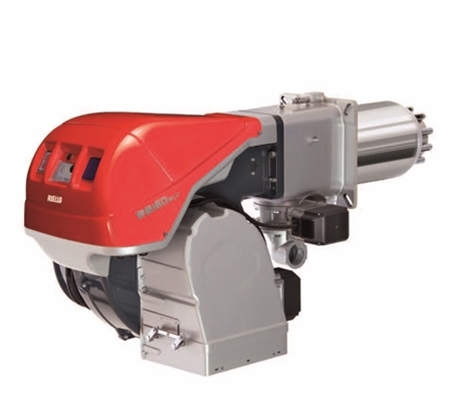 |
| Boiler Room. Image by upklyak on Freepik. |
Boilers are classified as Hydronics or Mechanical Systems in the HVAC industry. Hydronic systems use heated fluid to warm the air to the desired temperature and circulate it to the conditioned space by the HVAC system. Boilers have been part of the HVAC system for a long time and are usually implemented in the HVAC system if heating is needed, especially in cold countries where surrounding dry bulb temperature can reach up to -30°C to -40°C.
As the world is running behind in making everything smarter and more efficient, boilers are in the race to be a part of such a trend. Since boilers sometimes can be the expensive part of the whole HVAC system, engineers, contractors, and manufacturer representatives must understand recent advancements in the boilers. Here are some notable trends and advancements in boiler technology:
Condensing Boilers
Boilers are efficient in using their fuel to make heat whereas Condensing boilers are one step ahead. They are even smarter! Combustion creates hot air and if there is any leftover heat that wasn't utilized, it grabs that too. It's like not letting any bit of warmth go to waste.
 |
| Riello RTC-80 1000-5500 Condensing Boiler. Image by Riello. |
One of the design features that makes RTC-80 a top-notch condensing boiler is "3-pass firetube counter-flow heat exchanger" design. As the image illustrates, the heat shown in the arrows flows through a 3-pass tube structure to utilize the heat at maximum efficiency.
Smart Boiler Controls
"Smart" refers to integrating boilers with an Automation System that leverages the capabilities of the Internet of Things (IoT) and algorithms to enhance the efficiency, monitoring, and management of boiler systems. In simple terms, the role of smart boiler controls is to keep the right temperature, save energy, communicate with other HVAC systems, and learn about preferences.
| Smart Boiler Control 294 by Tekmar - A Watts Brand. Image by Watts. |
Tekmar, a Watts brand offers a product called "294" which is a Smart Boiler Control and operates both condensing as well as non-condensing boilers. These specific controls can handle four boilers at a time providing the end user a remote control through the web or app and even notifying through SMS or email.
Modular Boiler Systems
Modular Boiler Systems, as the name decodes, is a system that has a bunch of small boilers that when combined meet the required load. An interesting part of these systems is the flexibility, efficiency, and redundancy offered.
 |
| Riello Array v2. Image by Riello. |
Riello Array v2 model is a pre-packaged unit which means under a single platform the unit is flexible to operate at multiple capacities. The major advantage of a modular system is "Redundancy", which means the boiler can still operate if the adjacent module is under maintenance as well as they offer simple "Plug & Play Installation" during services and maintenance.
Hybrid Systems
Hybrid systems combine the boiler with renewable energy sources, either solar or heat pumps which are widely used in the market. The purpose of having the hybrid system is long-term cost saving, aiming to maximize efficiency and reduce reliance on natural gas. These systems are designed to leverage the strengths of both boiler and renewable energy sources to optimize performance and energy usage.
 |
| Hybrid Heat Pump and Boiler System. (Source: Carmichael, Richard & Rhodes, Aidan & Hanna, Richard & Gross, R. (2020). Smart and Flexible Electric Heat: An Energy Futures Lab Briefing Paper.) |
As illustrated in the image above, the heat pump uses geothermal energy, or in other words, Earth's warmth which makes the HVAC system or the hot water system more efficient. In place of a heat pump, a Solar Thermal Collector can also be replaced. Heat Pump usually extract heat from the air or ground and use it to warm up a space whereas Solar Thermal Collector can maximize energy to heat up the fluid from the sun during cold sunny days.
Variable-Speed Pumping Systems
Variable-speed pumping systems for boilers involve using Variable Frequency Drives (VFDs) or Variable Speed Drives (VSDs) to optimize the water flow rate. Optimizing the flow rate to the hydronic system improves energy efficiency and system performance.
Emission Reduction Technologies
The purpose of emission reduction technologies is to aid boilers to meet environmental standards which encompasses low-NOx burners and technologies to reduce pollutant emissions. Low NOx burners are one of the emission reduction technologies, whereas the others are Flue Gas Recirculation (FGR), Selective Catalytic Reduction (SCR), and Particle Filters.
 |
| Low NOx Burner by Riello. Image by Riello. |
FGR is a kind of recycling expert that takes some exhaust gases produced during combustion and sends them back to the combustion chamber which helps to reduce NOx emission as well as makes the burning process efficient. SCR is a special catalyst that transforms harmful NOx substances into harmless substances and a Particle Filter is a kind of mask that traps tiny particles to escape into the air.
Key Takeaways
The key takeaways to look at from the advancement in boiler technology are:
Efficiency Matters
Smart Controls for Better Management
Boiler integration with digital technologies offers the advantage of remote monitoring and predictive maintenance with a promise of better management for better efficiency.
Flexibility and Redundancy
Modular Boiler System with packaged multiple boilers provides greater advantages of flexibility and redundancy by working together to meet varying demands as well as maintenance without shutting off the system.
Renewable Energy Integration
Combining boilers with renewable energy sources like heat pumps and solar thermal collectors maximizes energy efficiency and reduces reliance on fossil fuels.
Optimized Water Flow
VFDs and VSDs optimize water flow rates which improves energy efficiency in hydronic heating systems.
Environmental Responsibilities
Emission Reduction Technologies highlights the commitment to helping boilers meet environmental standards by minimizing pollutant emissions and contributing to cleaner surroundings.
